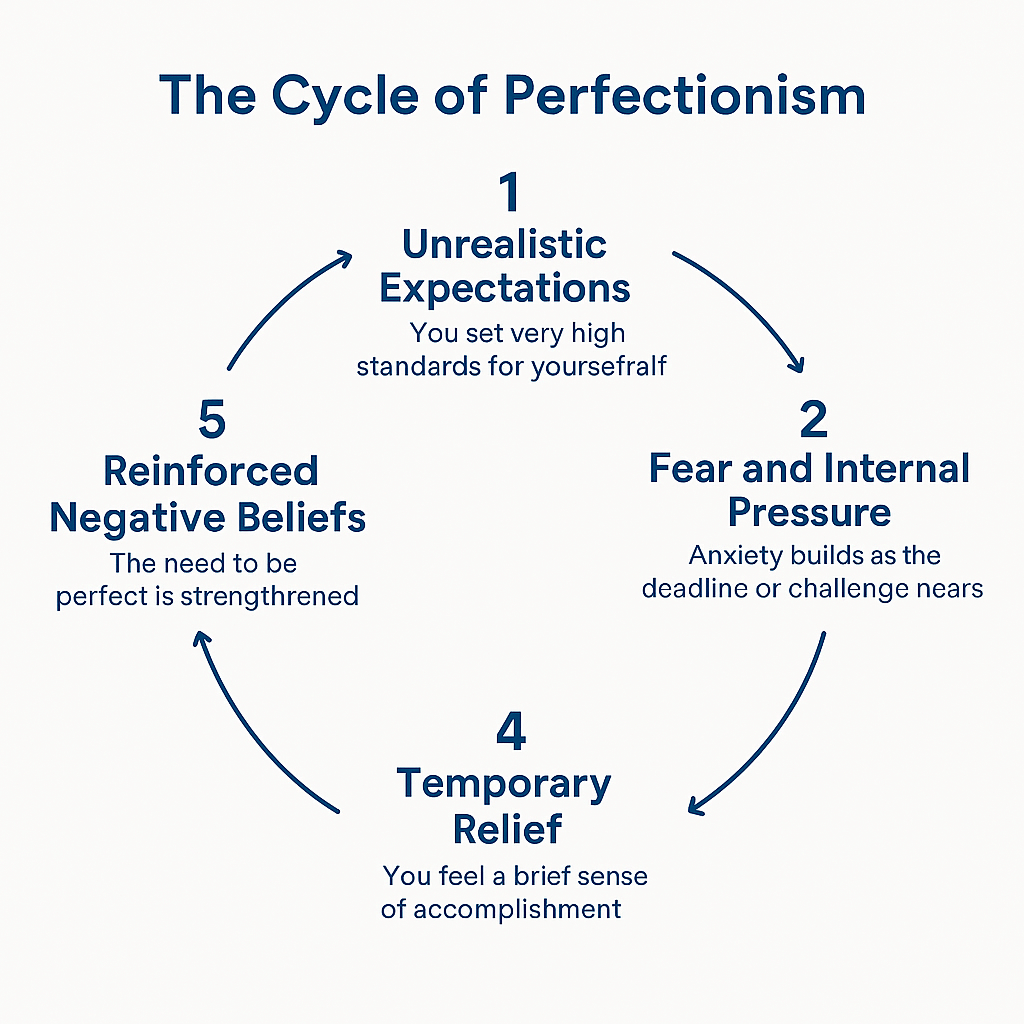Perfectionism Treatment in Houston, TX
Are you tired of feeling like it’s never enough? Does your mind replay mistakes, or do you avoid starting things for fear they won’t be perfect? Have you been planning to have people over or go out with a friend, but there’s always more to do before you’re ready? If so, you might be facing perfectionism. This mental pattern can chip away at your peace of mind, relationships, and overall well-being.
Maybe it’s time to break free from unrealistic expectations and start living authentically. At the Houston DBT Center, we help those feeling trapped by perfectionism. Whether it stems from anxiety, shame, or past experiences, we offer evidence-based treatments to help you regain control and live a fuller, more connected life.
Let’s take a closer look at perfectionism. First, do you have helpful or unhelpful perfectionism? Let’s find out.

The Difference Between Helpful and Unhelpful Perfectionism
Not all perfectionism is harmful. Surprised? Read on. There’s a clear difference between healthy striving and toxic perfectionism.
Helpful (Adaptive) Perfectionism
This type can be a strength when balanced and goal-directed. People with helpful perfectionism:
- Strive for excellence while accepting imperfection
- Learn from mistakes instead of spiraling into shame
- Set high—but—realistic goals
- Feel proud of accomplishments without linking them to self-worth
- Are motivated by growth, not fear
Example: A writer wants clear and polished work but is willing to submit a good draft. They know done is better than perfect.
Unhelpful (Maladaptive) Perfectionism
This form is rigid, fear-driven, and often leads to distress. People with unhelpful perfectionism:
- Set impossibly high standards and judge themselves harshly when they fail
- Avoid starting tasks they can’t “perfect”
- Procrastinate due to fear of failure
- Feel worthless or ashamed when they make mistakes
- Fear judgment and often hide struggles from others
Example: A student avoids turning in an assignment because it’s not “perfect enough.” They feel paralyzed, even after the deadline has passed.
Which one describes you? Knowing if your perfectionism helps or harms you is an important distinction. If it holds you back from your goals and happiness, then let’s explore the three main types of unhelpful perfectionism. Which one (or more) applies to you?
Three Types of Unhelpful Perfectionism
Perfectionism can appear in different ways, depending on the person and situation:
- Self-oriented perfectionism: You set very high standards for yourself. When you don’t meet them, you feel guilt or shame. It’s about seeing yourself as a failure. These unrealistic expectations make it impossible to win because you can never be perfect.
- Other-oriented perfectionism: You expect others to meet your high standards. When they don’t, you may feel frustrated or disappointed. You might criticize them or think they’re incompetent. This often leads to taking on too much yourself, leaving you overwhelmed with tasks at work or home. You may miss valuable feedback from others, which is crucial for doing a good job.
- Socially-prescribed perfectionism: You believe others expect you to be perfect. This leads to fears of judgment, chronic people-pleasing, or hiding your flaws. Your self-worth depends on what others think, but you can’t really know their thoughts. You keep imagining judgment and feeling inadequate.
These patterns often start early in life and can affect how you approach work, relationships, parenting, health, and personal goals. They can create a cycle where perfectionism feeds itself.
Cycle of Perfectionism
The cycle of perfectionism is a repeating pattern of thoughts, emotions, and behaviors that keeps you stuck in fear, self-criticism, and avoidance—even when you seem high-achieving. It often begins with the desire to succeed or avoid failure, but over time, it reinforces anxiety, burnout, and low self-worth.
Here’s a breakdown of the typical perfectionism cycle, followed by a real-life example:

- Unrealistic Expectations: You set very high standards for yourself, often too high to be fair or needed. These goals may seem “normal” to you, but they’re rooted in an intense fear of failure, judgment, or not being good enough.
- Fear and Pressure: As the deadline or challenge approaches, anxiety builds. You feel a strong pressure to do everything “perfectly.” You might focus too much on details. You worry about letting others down or being seen as inadequate.
- Overworking or Procrastinating: Some perfectionists spend too much time on tasks. They over-prepare, check their work too often, and wear themselves out. Others procrastinate entirely, paralyzed by the fear of not doing it perfectly. Often, there’s a combination of both.
- Temporary Relief or Shame: If the task is completed and goes well, you might feel temporary relief, but rarely satisfaction. You immediately think about what could’ve been better or what you “should” do next. If you fall short, even slightly, you may feel shame, self-criticism, or even hopelessness.
- Reinforced Negative Beliefs: No matter what happens, this process strengthens the belief: “I must be perfect to be accepted.”
The next time something is asked of you, the cycle begins again, with even more pressure than before. So perfectionism builds and builds.
Why the Perfectionism Cycle is So Hard to Break
The perfectionism cycle is hard to break because it’s reinforced by fear and short-term relief. You may feel less anxious when you’re “perfect,” which teaches your brain to keep repeating the cycle. But over time, the emotional cost grows, and the relief becomes shorter and less satisfying. Plus, the costs of perfectionism increase as time goes on.
Self Assessment
If you think you are struggling with perfectionism, consider the following questions:
- Do I often feel like nothing I do is ever good enough?
- Do I procrastinate because I’m afraid of doing something “wrong”?
- Do I beat myself up over small mistakes—even ones no one else noticed?
- Do I struggle to celebrate my successes or quickly move on to the next goal?
- Do I feel anxious or guilty when I rest or take a break?
- Do I avoid situations where I might not excel or be the best?
- Am I afraid others will reject me if they see my flaws or failures?
- Do I expect perfection from others and get upset when they fall short?
- Do I constantly compare myself to others and feel like I’m falling behind?
- When I succeed, do I feel relief, or more pressure to maintain that level?
Interpreting Your Answers:
- If you answered “yes” to several of these questions, you may be struggling with unhelpful perfectionism.
- If you said “yes” and feel flexible, motivated, and kind to yourself, your perfectionism may be more helpful.
- If your perfectionism causes distress, avoidance, or self-harm, it’s time to seek support.
If you found you might be struggling with unhelpful perfectionism, then let’s take a closer look at what might be at the root of it and what action might be helpful to consider
The Deeper Truth About Perfectionism
Perfectionism is rarely just about excellence. On the surface, it might look like ambition, discipline, or a commitment to high standards. But if you dig a little deeper, you’ll often find something else entirely: a longing to feel safe, accepted, or loved. Do you think that could be true for you?
Behind the Drive to Be Perfect Is the Fear of Not Being Enough
Many perfectionists believe their worth relies on their performance. This idea often starts in childhood or comes from tough experiences. They have a fear of rejection or abandonment if they aren’t perfect.
If you were only praised when you achieved—or were punished for falling short—you may have learned that love is conditional. Perfectionism becomes a way to avoid being left behind or seen as “less than.” : If you were criticized a lot—or praised only for achievement—you may have learned that love is earned, not given freely
Somewhere along the way, they internalized the message:
- “If I’m not perfect, I’ll be rejected.”
- “If I mess up, people will leave.”
- “I have to earn love by being exceptional.”
This belief system turns perfectionism into a form of emotional self-protection. By striving to be flawless, the perfectionist tries to avoid criticism, judgment, abandonment, or shame.
Need for Control in a Chaotic World
For some, perfectionism develops after trauma or instability. When life feels unpredictable or unsafe, being perfect becomes a way to feel in control. It’s a shield against chaos and uncertainty. For some who have experienced trauma, perfectionism develops as a survival strategy to stay in control or avoid harm. Conscientious, sensitive, and responsible people may be more prone to perfectionism.
A Desire to Belong
At its core, perfectionism is often a misguided attempt to earn connection. The perfectionist hopes that if they can be “good enough,” they’ll finally be accepted, praised, or included. Cultural messages about success, looks, and gender roles can heighten the pressure to seem perfect.

Is Perfectionism Treatment Necessary?
The impact of perfectionism is often invisible, but very real. The impact can also be significant and cause suffering and pain. Many people with perfectionism seem successful and driven on the outside. But beneath the surface, they’re battling exhaustion, self-doubt, and fear of failure. If not dealt with, perfectionism can harm emotional health, relationships, work, and overall life quality.
Here are some of the ways perfectionism can impact your life:
1. Burnout and Chronic Fatigue
Perfectionists often go too far. They work long hours, focus on tiny details, and redo tasks to make them perfect.” This constant drive to achieve more, do better, and never let anything slip can result in physical and emotional exhaustion. Over time, the body and brain wear down. Even simple tasks can feel overwhelming. You may find yourself unable to rest, constantly thinking about what still needs to be done, or waking up tired no matter how much sleep you get. Eventually, this chronic stress can lead to burnout, fatigue, and even health issues such as headaches, digestive problems, or insomnia.
2. Relationship Conflict, Disconnection, and Loneliness
One of the most painful—and often overlooked—impacts of perfectionism is the strain it places on relationships..
Perfectionism may lead to:
- Emotional walls: You may struggle to admit when you’re struggling, which can prevent others from feeling close to you.
- High expectations of others: You might expect loved ones to be perfect, just like you expect from yourself. This can lead to disappointment, resentment, or criticism that damages trust.
- Fear of conflict or disapproval can lead you to avoid honest talks. You might hide your needs to keep the peace. This can create unspoken tension and resentment.
- Codependency or control: Some perfectionists feel responsible for managing everything in a relationship. This can cause controlling behavior or too much responsibility. As a result, others may feel smothered or helpless.
- Loneliness can hit even when you’re with others. Perfectionism can make you act in a way that feels “performative.” This might leave you feeling unseen or misunderstood, even with those closest to you.
Over time, these patterns can cause loved ones to feel they’re walking on eggshells or never good enough. This creates emotional disconnection and leaves both people feeling unfulfilled or hurt. Many perfectionists report feeling isolated, even when they are not physically alone.
3. Low Self-Esteem or Imposter Syndrome
People with perfectionistic tendencies often measure their worth by what they accomplish. When things go well, they feel temporary relief—but not real pride. When things go wrong, even in minor ways, they feel deeply flawed. Over time, this mindset erodes confidence and leads to constant self-doubt. Even after reaching goals, many perfectionists feel like frauds, waiting to be “found out.” This is known as imposter syndrome, a belief that your success is undeserved, or that you’re only as good as your last performance.
4. Avoidance of Growth Opportunities
Ironically, the fear of failure that fuels perfectionism often holds people back from the very growth they want. You may skip job applications, avoid meetings, and hesitate to start new projects. If you can’t do it perfectly, you might think, “Why try?” This fear-based avoidance can limit your career, education, or personal development.
5. Delayed Decisions or Missed Deadlines
Perfectionists often struggle to make decisions because they fear choosing the wrong option. They may over-research, over-plan, or overthink every possibility, leading to paralysis. This happens a lot in schools and workplaces. Even small choices can seem very important. Ironically, the quest for perfection can result in procrastination and delays. Tasks pile up. Deadlines pass. And with each missed opportunity, the pressure grows, reinforcing the belief that you “can’t get it right.” What starts as a desire to do things well can spiral into ongoing avoidance and self-sabotage.
6. Mental Health Conditions
Perfectionism often connects to anxiety, OCD, depression, eating disorders, and overcontrolled personality styles like OCPD.
7. Physical Symptoms
When you are struggling with perfectionism, you may have sleep issues due to racing thoughts, chronic muscle tension or headaches, fatigue from overwork or stress, digestive issues, or appetite changes. Perfectionism is stressful, and the results are felt in the body.
You Don’t Have to Earn Worth
Here’s what we tell our clients: You don’t have to be perfect to be lovable. You don’t have to prove your worth through performance. You don’t have to suffer in silence just to feel safe.
And the good news is that perfectionism is not a permanent trait—it’s a learned pattern. And like all patterns, it can be unlearned.
Disrupting the Perfectionism Cycle
At the Houston DBT Center, our compassionate therapists provide multiple therapies for perfectionism, including RO DBT, DBT, CBT, and ACT. These therapies have commonalities, and overall benefits of all of them include:
- Recognize and challenge unrealistic expectations
- Develop a more flexible and compassionate inner voice
- Tolerating “good enough” outcomes without spiraling into shame
- Learn to take healthy risks and handle mistakes as part of growth
- Reconnect with your values, not just outcomes
Let’s take a closer look at each approach and who might benefit from each one:
Radically Open DBT (RO DBT)
Best for: Overcontrolled individuals, those with emotional inhibition, or chronic perfectionism
RO DBT helps clients who tend to be overly controlled, emotionally constrained, and perfectionistic. These individuals often avoid vulnerability and find connection difficult.
RO DBT helps you:
- Build emotional openness
- Reduce the urge to control everything
- Increase spontaneity and self-trust
- Strengthen social connection and belonging
- Learn how to tolerate uncertainty and imperfection
Dialectical Behavior Therapy (DBT)
Best for: Those who experience perfectionism alongside emotional dysregulation, mood swings, and impulsive behaviors.
DBT focuses on four core skill areas: Mindfulness, Distress Tolerance, Emotion Regulation, and Interpersonal Effectiveness.
DBT helps you:
- Be present without judgment
- Let go of black-and-white thinking
- Regulate overwhelming emotions
- Build self-compassion and resilience
- Manage emotions to stop impulsive responding
Cognitive Behavioral Therapy (CBT)
Best for: Identifying thought traps and unhelpful beliefs
CBT helps clients reframe perfectionistic thoughts, such as:
- “If I’m not perfect, I’ll be rejected.”
- “Making a mistake means I’m a failure.”
- “I can’t relax unless everything is done.”
CBT helps you:
- Spot distorted thinking
- Practice flexible beliefs
- Develop a more balanced, realistic inner voice
ACT
Perfectionism often involves rigid standards, fear of failure, and harsh self-criticism. ACT assists by:
- Accepting Imperfection: Teaching you to embrace flaws and mistakes as part of the human experience.
- Clarifying Values: Helping you identify what truly matters, shifting focus from unattainable standards to meaningful goals.
- Committed Action: Encouraging steps toward your values, even in the presence of self-doubt or anxiety.
- Mindfulness Practices: Focus on being present to cut down on overthinking and self-judgment.
These strategies reduce the grip of perfectionism, leading to improved well-being and fulfillment.
What You’ll Learn in Perfectionism Treatment
Through our structured programs, you’ll develop tools to:
- Accept yourself even when things aren’t perfect
- Respond to failure with curiosity, not shame
- Set boundaries and ask for help
- Take healthy risks without overpreparing
- Notice when you’re being overly rigid or self-critical
Progress often looks like this:
- Turning in a paper that’s 90% done rather than skipping it entirely.
- Speaking up even if your voice shakes.
- Going to a social event even if you feel anxious.
- Making a mistake and still believing you’re enough.
Perfectionism Treatment at Houston DBT Center
At the Houston DBT Center, we offer a warm, judgment-free space to unpack and challenge perfectionism. Our treatment focuses on building flexibility, self-compassion, and openness to imperfection.
We offer different approaches to fit your specific needs. We offer individual sessions, group skills classes, and an IOP. Our therapists are trained to address perfectionism in context, not as a personality flaw, but as a learned strategy that once helped, and now holds you back.
Whether you’re in the Houston area or prefer remote options, our team is ready to support you. We offer HIPAA-compliant teletherapy as well as in-person care at our Houston office.

Frequently Asked Questions (FAQ) About Perfectionism Treatment
How long does it take to see change?
Many clients report insight and relief within a few sessions, but deeper change often takes time. Depending on the severity, treatment may last several months or longer.
Can I work on perfectionism even if I’ve had therapy before?
Absolutely. Our approaches, like RO DBT and DBT, are specifically designed for clients who haven’t found relief through traditional methods.
Does perfectionism cause overthinking?
Yes—perfectionism and overthinking are deeply connected, and perfectionism is one of the most common causes of chronic overthinking.
Here’s why:
Perfectionism creates a mental environment where nothing ever feels “done enough” or “right enough.” This naturally leads to looping thoughts, second-guessing, and mental paralysis.
Here’s how the perfectionism-overthinking loop usually works:
- High Pressure: “I have to get this right.”
- Overthinking: “Let me plan, recheck, and analyze every detail.”
- Procrastination or Exhaustion: “It’s too overwhelming.”
- Self-Criticism: “Why can’t I just do things like other people?”
- Repeat: “Next time, I’ll try even harder to be perfect.”
What triggers perfectionism?
Here are some common personal perfectionism triggers, with common categories and reflection questions:
Common Triggers for Perfectionism
-
Fear of Judgment or Criticism
You may feel a strong urge to be perfect when you’re afraid of being judged, corrected, or misunderstood.
Triggering situations:
- Getting feedback from a boss, teacher, or partner
- Posting something online
- Being observed while working or performing
- Public speaking or presenting
Ask yourself:
“Do I worry more about how I’ll be seen than what I want to say or do?”
-
High-Stakes or Performance-Based Tasks
You might become perfectionistic when something feels important, public, or linked to your identity.
Triggering situations:
- Job interviews or promotions
- Tests, papers, or big projects
- Hosting an event or planning a gathering
- Cooking for a dinner party
Ask yourself:
“What would it mean about me if I failed at this?”
-
Uncertainty or Feeling Out of Control
Perfectionism often flares up when things feel unpredictable. You may try to “get everything right” to create a sense of safety.
Triggering situations:
- Moving, starting a new job, or life transitions
- Feeling unsure about a relationship
- Facing an illness or unexpected news
- Starting something you’ve never done before
Ask yourself:
“Am I trying to control this because I feel anxious or uncertain?”
-
Social Comparison
Perfectionism can spike when you compare yourself to others and feel like you’re falling behind or not measuring up.
Triggering situations:
- Scrolling social media
- Hearing about a peer’s achievements
- Attending reunions, networking events, or weddings
- Watching others seem relaxed or confident
Ask yourself:
“Am I being hard on myself because I think I should be further along?”
-
Old Patterns from Childhood or Trauma
Some triggers are tied to deeper emotional history, like needing to be “the responsible one,” or fearing punishment for mistakes.
Triggering situations:
- Feeling like you disappointed someone
- Being asked for help (when you’re already overwhelmed)
- Being around authority figures
- Feeling emotionally exposed or vulnerable
Ask yourself:
“What part of me is trying to stay safe right now by being perfect?”
To discover your own triggers, try journaling after moments when your perfectionism shows up. Ask:
- What was happening?
- Who was I with?
- What was I afraid would happen if I didn’t get it right?
- What did I believe about myself in that moment?
After you find your triggers, you can respond more mindfully. Use self-compassion, set realistic expectations, and apply coping skills.
Perfectionism Treatment Testimonials
“Before therapy, I thought being perfect was the only way to be loved. Now, I know I’m allowed to be human. That’s changed everything.” — Former Client, Age 35
“I came to Houston DBT Center exhausted. I was tired of never feeling good enough. The tools I’ve learned here helped me enjoy my life again.” — Former IOP Participant
Ready to Get Started?
Call today at 713-973-2800 or contact us online to schedule an intake consultation. We’re here to help you heal from perfectionism and start living your life—fully, freely, and imperfectly.
Houston DBT Center Real Healing. Real Connection. No Perfection Required.
Break Free from Unrealistic Expectations with Perfectionism Treatment in Houston, TX
You don’t have to keep living under the pressure of perfection. The Houston DBT Center offers compassionate, evidence-based care to help you shift out of fear and into freedom. If you’re ready to make a change, reach out today for perfectionism treatment in Houston, TX. Follow these three simple steps to get started:
- Call 713-973-2800 or email administration@houstondbtcenter.com today for a free consultation.
- Meet with a supportive therapist to evaluate your needs and goals.
- Start overcoming perfectionism!
Additional Services Offered by Houston DBT Center
At Houston DBT Center, perfectionism treatment is just one service we offer to help you when it comes to overcoming perfectionism. We also provide targeted trauma treatments such as DBT, EMDR, and CPT, along with Radically Open DBT, Adult IOP, Teen IOP, parent coaching, and play therapy. Our team of over 15 dedicated therapists delivers holistic mental health support and works closely with families to ensure meaningful progress. Don’t forget to visit our blog for additional resources and support!
